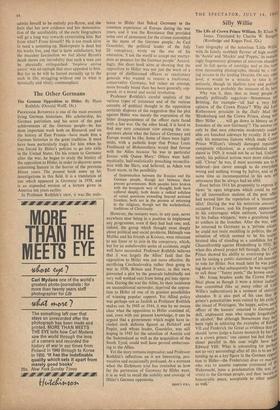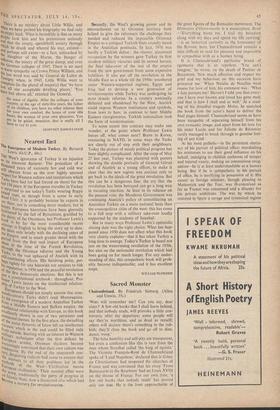Silly Willie
The Life of Crown Prince William. By Klaus W. Jonas. Translated by Charles W. Bangert (Routledge and Kegan Paul, 32s.) THIS biography of the notorious `Little Willie: w. ith its faintly snobbish flavour of high socielY, its 'Auwis' and 'Muckis' and Puppis,' its tantalls' ingly fragmentary glimpses of amorous abandon, its ts full quota of nostalgic and at the sell° time nauseating photographs, should be a roe ing success in the lending libraries. On any other level, it would be a mistake to take it to°, seriously, though its shallow tone and politic innocence are probably the measure of its het°'
Why was it, then, that so many people re; putedly politically sagacious—Stresemann an!
Britning, for example—`all had a very , opinion of the Crown Prince'? Why did Lord Rothermere proclaim in the Daily Mail tIVI! 'Hindenburg and the Crown Prince, along wit' Herr Hitler . . . will go down in history as the founders of the new Germany'? The answer al only be that men otherwise moderately reason' able are knocked sideways by royalty. If it Well only his numerous liaisons which made Cr00 Prince William's 'already damaged reputation completely ridiculous,' as a confidential repo stated in 1929, it would not be so bad. Unfortn' nately, his political actions were more ridiculons still. 'Clever' he was, if most accounts are to.be believed—just clever enough to do everythlog wrong and nothing wrong by halves, and at thAe same time so inconsequential in his acts ail" utterances that he always had an alibi. Even before 1914 his propensity to express 10, views 'in open telegrams which could be reP, by all intermediate stations of the post office had earned him the reputation of a 'monstron idiot.' During the war his notorious amours le occupied France, and his frequent appearancej in his extravagant white uniform, 'surround by his Indian whippets,' were a gratuitous instil to soldiers in the trenches. After the war, wile, he returned to Germany as a 'private citizefl;, he could not resist meddling in politics, the 01, mination of which seemed to be his scatte, brained idea of standing as a candidate for WI Chancellorship against Hindenburg in 1932. 10,, when this absurd project fell through, the Crovo Prince showed his ability to overtrump his 0.gifjo ace by issuing a public statement of his intentl°, to vote for Hitler. Not much later he was polled ing about in what subsequently he was regretfO,111 to call those '"funny pants," the brown ones. „ Mr. Jonas brushes aside the Crown Prince' Nazi phase as though it were a minor indis.erfe tion committed (like so many other of Lttt', Willie's indiscretions) in a moment of oblivion; abandon. It is also part of his case that til, prince's potentialities were ruined by his exile the island of Weiringen; 'the happy, active, sinal:0 officer of the hussars' returned to GermanY dull, unpleasant man who sought forgetfulonse in alcohol.' But although Stresemann may fiaed been right in adducing the examples of Edwne, VII and Frederick the Great as evidence that on; should 'never judge a future monarch by his 0111,e as a crown prince,' one cannot but feel that w, closer parallel in this case might have becti Edward VIII. What is astounding (or perhn,P, • not so very astounding) after all this is to see 1311i; turning up as a key figure in the German opPo.so tion to Hitler—the Frederician deus ex maclist„le who was to assume supreme command of tP,, Wehrmacht, issue a proclamation (the text stilt, vives) to the German people, and then 'secure honourable peace, acceptable to other nay(/' as well.' tliE SPECTATOR, JULY 14, 19o. ,tad that the empty, spendthrift society through 1'0111Plain (in the plural of majesty) that `we have P'llen we have probed his biography we find only Inernpty husk. What is incredible is that so many tle°Ple took him and his pretensions seriously "ich he drank and whored his way, existed— IV perhaps still exists—as a fact, untouched by !,efiation, the misery of the great slump, and even Lille German collapse of 1945. There is no need 'pe last word was said by General de Lattre de ,(Issigrly when, in 1945, Little Willie went to 4aVe lost above all,' retorted the General,
e slaughter of the Marne, the hunger of There is no mystery about Little Willie, and waste sympathy on Crown Prince William, and
all our acceptable dwelling places.' You the sense of dignity. After the collapse of your c?antrY, at the age of sixty-five years, the father of six children, you have no other interest than for your own comfort, the house of your idle hours, the woman of your own pleasures. You
to be pitied, monsieur, that is really all I nave to say to you.
GEOFFREY BARRACLOUGH



































 Previous page
Previous page